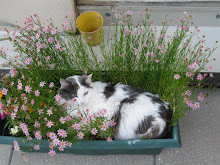 ‘In each other’s shadows’: Behind Irish
outpouring of relief for Navajo
‘In each other’s shadows’: Behind Irish
outpouring of relief for Navajo
- By Harry Bruinius Staff writer
New York
My husband showed me an article from The Christian Science
Monitor, May 13 issue, this week that really touched us. If only we could all
be this kind and thoughtful.
Cassandra Begay felt a quiet sense of awe earlier this month
when she and other Navajo and Hopi women watched their COVID-19 fundraiser
begin to double, inexplicably, in less than a week.
The women’s relief effort, launched in mid-March,
had already been quite successful, she says, raising about $1.3 million to
provide food and water for the most vulnerable living in their nations’ remote
communities – who have been among those most afflicted by the coronavirus
pandemic across the United States.
“Then one of my teammates, she’s like, ‘Hey, guys, we’re all
of the sudden receiving a flood of donations from Ireland!’” says Ms. Begay, a
Navajo activist who’s been handling the team’s communications. “And so we’re,
like, ‘What’s going on? Why us? Why is a whole country all of the sudden
donating to us?’”
There were thousands of unfamiliar names appearing on the team’s GoFundMe page
– the first names Siobhán, Padraig, and Aoife, or surnames O’Leary, McMullen,
and Gallagher – each donating small amounts from across the Atlantic. Many
posted a common Irish proverb: Ar scáth a chéile a mhaireann na daoine,
which means, “In each other’s shadows the people live.”
The women soon learned why the donations, now at more than
$3.6 million, were pouring in: After hearing about their fundraiser, many
people in Ireland recalled a moment from their own history more than 170 years
ago. Another tribe of America’s first peoples, the Choctaw, raised $170 (about
$5,000 in today’s dollars) and sent it to starving Irish families during the
Potato Famine in 1847.
“I’m sure Ireland received all sorts of donations from
around the world back then, but that’s the one that has stuck with us,” says
Maria Ferrell, an Irish writer living in London. “It’s one of those stories
that we have about a people who were there for us when we were weak and
powerless and alone. They helped us, and now we’re friends forever.”
A different people whose ancestral lands were over 1,200
miles from the Hopi’s and Navajo’s, the Choctaw collected their modest donation
just a few years after the infamous Trail of Tears, when the U.S. government
forcibly removed them from their ancestral lands across the South, killing
thousands.
“I think the gift touched and stayed with Irish people so
much, basically because it wasn’t charity. It was an act of solidarity,” Ms.
Ferrell says. “The Choctaw people, they were giving it to us because they saw
us, they recognized us and our plight as being similar to theirs.”
COVID-19 crisis has affected Native peoples across the U.S.
in disproportionate numbers. The Navajo Nation in Arizona and New Mexico, with
a population of about 330,000, now has more coronavirus cases per capita than
any state, according to the Navajo health agency.
Given how infectious diseases brought over from Europe, such
as the measles and smallpox, wiped out large swaths of native populations, many
observers say the outsize effects of COVID-19 today on Native peoples are
particularly poignant.
More than a third of their nation’s members have no running
water or electricity The area is also considered a food desert, with only 13
grocery stores serving more than 180,000 people. Even before the lockdown,
unemployment hovered around 50%.
But one of the most critical problems on Navajo lands has
been the lack of health care infrastructure. The situation has become so dire
that the international relief agency Doctors Without Borders, which serves
poverty stricken and war-torn areas throughout the world, sent a delegation of
health care workers to the United States for the first time.
Ms. Begay’s grandmother is among those living without
running water and electricity. Her best friend contracted the virus, too, she
says. Unable to see him face to face, she’s been leaving meals and bouquets of
flowers near his front door.
“It’s been heartbreaking, but it’s also been – it feels good
to come from a place of strength and compassion and grace for our people,” Ms.
Begay says through tears. “And for me personally – I get emotional about this,
because I know this is a dark time for us – but, you know, with the outpouring
of support from the Irish people because of what the Choctaw ancestors did 173
years ago – it’s so good to be a part of that history, a positive part of that
history.”
Her people have a concept similar to that in the Irish
proverb appearing on their fundraising site, she says, a spiritual idea called K’é.
“It’s about the importance of honoring the sacredness of our
relations to each other,” she says. “It’s the principal belief that where we come
from – our family, our community, our nation, as well as our relations with
other people, and not only just humans, but of all things – it’s a sacred
relationship.”
“But I know that I won’t have any regrets from this part of
my life and in this time of history,” she continues. “With the outpouring of
support from our Irish friends because of what the Choctaw ancestors did 173
years ago ... it’s something we’ll always remember, and our children will
remember, and there will come a day when we will pay it forward, too.”
What can we do? How can we help?

